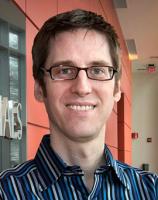Difference between revisions of "Kevin Yager"
KevinYager (talk | contribs) |
KevinYager (talk | contribs) |
||
| (6 intermediate revisions by the same user not shown) | |||
| Line 1: | Line 1: | ||
| − | [[Image: | + | [[Image:yager02.jpg|right]] |
| − | '''Kevin Yager''' is a | + | '''Kevin Yager''' is a materials scientist and group leader at [[Brookhaven National Laboratory]], working in the [[Center for Functional Nanomaterials]] (CFN). He participated in the conception, design, and construction of next-generation beamlines at [[NSLS-II]]; specifically the Complex Materials Scattering ([[CMS]]) and Soft Matter Interfaces ([[SMI]]) beamlines. |
Kevin is active on this site ([[User:KevinYager]]), and is happy to answer questions about x-ray scattering experiments or data analysis. | Kevin is active on this site ([[User:KevinYager]]), and is happy to answer questions about x-ray scattering experiments or data analysis. | ||
==Scattering Expertise== | ==Scattering Expertise== | ||
| − | Kevin has worked as a beamline scientist on the [[X9]] beamline at NSLS, where he helped users perform a wide variety of x-ray scattering experiments ([[SAXS]], [[WAXS]], [[GISAXS]], [[GIWAXS]]). Kevin has also used neutron techniques, including neutron scattering ([[SANS]], [[GISANS]], [[RSANS]]) and neutron reflectivity ([[NR]]). | + | Kevin has worked as a beamline scientist on the [[X9]] beamline at [[NSLS]], where he helped users perform a wide variety of x-ray scattering experiments ([[SAXS]], [[WAXS]], [[GISAXS]], [[GIWAXS]]). Kevin has also used neutron techniques, including neutron scattering ([[SANS]], [[GISANS]], [[RSANS]]) and neutron reflectivity ([[NR]]). He was involved in the development of the [[GTSAXS]] technique. |
| + | |||
| + | He is actively involved in developing new models for analyzing and fitting x-ray scattering data; e.g. he recently developed a formalism for handling data from [[lattices of nano-objects]] (c.f. [[Paper:Periodic lattices of arbitrary nano-objects: modeling and applications for self-assembled systems|summary of paper]].). He is also interested in the application of Artificial Intelligence and Machine-Learning (AI/ML) methods to synchrotron beamlines; in particular working with a team that is deploying [[Autonomous Experimentation]] at beamlines. | ||
==Scientific Interests== | ==Scientific Interests== | ||
| − | Kevin is interested in soft materials and self-assembly. In particular, he has worked on problems in [[block-copolymers]] (fundamental physics, directed assembly, | + | Kevin is interested in soft materials and self-assembly. In particular, he has worked on problems in [[block-copolymers]] (fundamental physics, directed assembly, nonequilibrium ordering, etc.), organic photo-voltaics, and nanoparticle [[superlattices]]. |
==See Also== | ==See Also== | ||
* [http://yager-research.ca/ Research site] (including publication list). | * [http://yager-research.ca/ Research site] (including publication list). | ||
* [http://www.bnl.gov/cfn/people/staff.php?q=150 CFN staff site]. | * [http://www.bnl.gov/cfn/people/staff.php?q=150 CFN staff site]. | ||
Latest revision as of 06:51, 9 August 2020
Kevin Yager is a materials scientist and group leader at Brookhaven National Laboratory, working in the Center for Functional Nanomaterials (CFN). He participated in the conception, design, and construction of next-generation beamlines at NSLS-II; specifically the Complex Materials Scattering (CMS) and Soft Matter Interfaces (SMI) beamlines.
Kevin is active on this site (User:KevinYager), and is happy to answer questions about x-ray scattering experiments or data analysis.
Scattering Expertise
Kevin has worked as a beamline scientist on the X9 beamline at NSLS, where he helped users perform a wide variety of x-ray scattering experiments (SAXS, WAXS, GISAXS, GIWAXS). Kevin has also used neutron techniques, including neutron scattering (SANS, GISANS, RSANS) and neutron reflectivity (NR). He was involved in the development of the GTSAXS technique.
He is actively involved in developing new models for analyzing and fitting x-ray scattering data; e.g. he recently developed a formalism for handling data from lattices of nano-objects (c.f. summary of paper.). He is also interested in the application of Artificial Intelligence and Machine-Learning (AI/ML) methods to synchrotron beamlines; in particular working with a team that is deploying Autonomous Experimentation at beamlines.
Scientific Interests
Kevin is interested in soft materials and self-assembly. In particular, he has worked on problems in block-copolymers (fundamental physics, directed assembly, nonequilibrium ordering, etc.), organic photo-voltaics, and nanoparticle superlattices.
See Also
- Research site (including publication list).
- CFN staff site.
